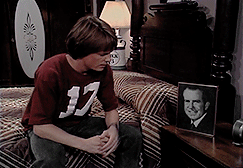Books on GIF #97—'The Final Days' by Bob Woodward and Carl Bernstein

Welcome to the latest edition of Books on GIF, the animated alternative to boring book reviews. This Sunday's selection is ‘The Final Days’ by Bob Woodward and Carl Bernstein.

Hope everyone’s new year is off to a good start. It’s been nearly a month since my last newsletter. I was delayed by the usual things: the holidays, end-of-year work stress and a self-imposed hiatus to recharge my batteries. This book wasn’t in my reading queue until a few weeks ago. It had been lingering on my shelves for probably longer than a decade, but it kept popping up on Twitter, in articles and on podcasts with all the recent talk of impeachment and our ongoing political scandals. When I thought about whether Woodward and Bernstein’s book about the endgame of Watergate and President Nixon’s resignation should jump the line because it was topical, I was like:

I figured it would be a quick read, but boy was I wrong! It took me nearly an entire month to get through it. Part of the reason is that the book is geared toward a reader in 1976 who already knows all the players in it and doesn’t need their characters fleshed out. It was hard to connect to most of those in the narrative because I have no memory of them as real people who exist outside of the historical record. Plus, as you’ll see below in the excerpt, the writing is dry like day-old turkey, and just as likely to cause drowsiness. It seemed every time I tried to make reading headway, I was like:

But what ‘The Final Days’ lacks in style and energy it makes up for in substance and detail. The book is divided into two sections. The first provides context about the months leading up to Nixon’s departure, basically picking up where Woodward and Bernstein’s first book, the iconic ‘All the President’s Men,’ leaves off. It focuses mainly on Nixon’s White House taping system, which recorded him participating in the Watergate coverup, and the legal wrangling over the president releasing those tapes. The second section devotes a chapter to each day of Nixon’s final week in office. These sections both are packed with tremendous reporting and detail, from what various characters were thinking to what was written on a piece of paper folded inside someone’s pocket to the throwaway line that Henry Kissinger had a pornographic novel with him on a diplomatic trip abroad. Woodward and Bernstein interviewed dozens of White House insiders for this book, and I wondered about how much an individual’s forthcomingness contributed to their amount of screen time and to the overall narrative. Chief of Staff Alexander Haig, for example, is in nearly every scene, and comes across as doing yeoman’s work to keep the White House together as Nixon, increasingly drunk, despondent and irrational, weighs leaving office or fighting impeachment to the bitter end. But I also felt that Haig was a slick political operative deftly aligning forces to move Nixon out of office ostensibly to save the country from more political turmoil, but also to save his own career. Indeed, one of the things that stood out to me the most in this book is how quickly and completely Nixon defenders abandoned him at the end, like:

‘The Final Days’ is interesting to read through the prism of the Trump era. There are many similarities between then and now, from a special counsel investigation to hush-money coverups to talk of ‘witch hunts’ to presidents as unindicted co-conspirators. There are also many insights into the political calculations involved in a scandal of this magnitude, including what evidence of wrongdoing eventually causes politicians to abandon their leader. But I’m not going to get into any of that. Instead, I want to talk briefly about a scene at the end of the book on the eve of Nixon’s departure. The president calls Henry Kissinger to his private office, and the two drink and reminisce. The president then breaks down and asks his secretary of state to kneel down on the carpet and pray with him. Then Nixon sobs and pounds the carpet with his fist while Kissinger tries to console him. The scene was so dramatic and tragic, and unlike any other in the book, that I was like:

But the story continues. After Nixon regains his composure, Kissinger returns to his office where the phone rings. It’s Nixon. “Henry, please don’t ever tell anyone that I cried and that I was not strong,” he says. I was blown away by that line. And about Kissinger, I was like:

I felt bad for Nixon. Not because of Watergate or anything, but because he spent that private moment of vulnerability and pain with someone who would betray his trust. It reminded me that sometimes:

So there’s just one vivid and memorable scene in a 500-plus page book. If you’re a political or history junkie, or want insights into our current political situation, I’d recommend it to you. But if you’re looking for a gripping political tale, skip it.
How it begins:
This was an extraordinary mission. No presidential aides had ever done what they were about to do. J. Fred Buzhardt and Leonard Garment settled into their first-class seats on Eastern flight 117 from Washington, D.C., to Miami. They had reached an inescapable conclusion, and had reviewed the reasons over and over. Garment had a list on a yellow legal pad—now twenty-two or twenty-three items. It was a bleak and very unpleasant business.
The two men left behind a cool Saturday in Washington. It was November 3, 1973. The only good news for the White House that day was an unexpected strike at the Washington Post. The newspaper that morning had been only a real-estate section.
For most of the travelers, the flight was an occasion for relaxation, the beginning of a vacation. But Buzhardt and Garment were grim and tense as they rehearsed their presentation.
They were both lawyers. For the past six months they had handled President Richard Nixon’s Watergate defense. They had become close friends. Because the two men, seemingly so different, had agreed about this mission, their advice might carry some weight. They knew they would not be facing a receptive audience, but together they might be persuasive: Garment, the liberal, intellectual New Yorker, and Buzhardt, the conservative, practical Southerner. They sometimes thought of themselves as reflecting two sides of the Nixon personality—good and bad, some would say, hard and soft. It was not that simple.
My rating:

‘The Final Days’ by Bob Woodward and Carl Bernstein was published in 1976 by Simon & Schuster, and in 1977 by Avon Books. 529 pages, including the index. $1.50, but I forget where I got it. Probably somewhere in Boston.
In case you missed it: Books on GIF #96 featured ‘Eileen’ by Ottessa Moshfegh.
What's next: In two weeks you’ll get a review of ‘Rage Becomes Her’ by Soraya Chemaly. Also in the queue are ‘Unclaimed Baggage’ by Jen Doll, ‘No Matter How Much You Promise to Cook or Pay the Rent You Blew It Cauze Bill Bailey Ain’t Never Coming Home Again’ by Edgardo Vega Yunqué and ‘Asymmetry’ by Lisa Halliday.
Shoot me an email if there’s a bestseller, a classic or a forgotten gem you want me to review.
Follow me on Twitter and Instagram.
Thanks for reading, and thanks especially to Donna for editing this review!
Until next time,

MPV



